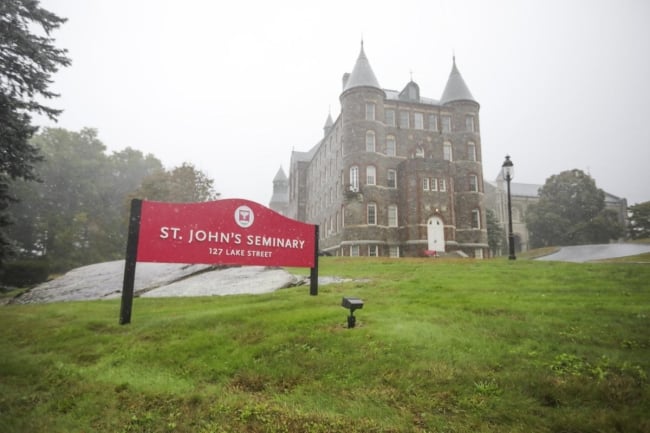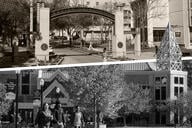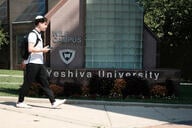You have /5 articles left.
Sign up for a free account or log in.

MediaNews Group/Boston Herald/Getty Images/Contributor/MediaNews Group RM
A major effort is underway to encourage and promote innovation at more than 200 seminaries across the country, at a time when many of them are grappling with “rapid and profound” social change. Many institutions are facing financial challenges, experiencing flat or declining enrollment, and are struggling to adapt to the shifting needs and expectations of the communities they train religious leaders to serve.
The Lilly Endowment, an Indiana-based private philanthropic foundation, is leading an initiative to help seminaries remain viable and better prepare Christian clergy for the future by providing large grants to fund efforts by seminaries to recruit more diverse students, expand hybrid and online course offerings, and make theological education more affordable, accessible and financially sustainable.
The initiative, Pathways for Tomorrow, was launched last year and encompasses 234 institutions in all. About $96 million was awarded in 2021, with more grants to come this year.
“Through the Pathways initiative, theological schools will take deliberate steps to address the challenges they have identified in ways that make the most sense to them,” Christopher L. Coble, vice president for religion at the Lilly Endowment, which is focused on community development, religion and education, said in a press release. “We believe that their efforts are critical to ensuring that Christian congregations continue to have a steady stream of pastoral leaders who are well-prepared to lead the churches of tomorrow.”
The first phase of the initiative awarded planning grants of up to $50,000 to the institutions. More recently, $82 million went to 84 theological schools to implement new projects. Several grants of up to $5 million, focused on larger-scale projects that involve collaborating and developing best practices that can be applied across institutions, will be awarded this summer.
Judith Cebula, communications director at the Lilly Endowment, said seminaries are working to train leaders to serve increasingly diverse congregations of varying sizes, and they are offering flexible course options for older students with families and exploring new financial models.
“The established educational strategies and financial structures that many theological schools have relied on for the last several decades are under severe strain,” she said in an email. “The Endowment seeks to help theological schools take robust steps to identify and address their most pressing challenges and take advantage of promising opportunities in ways that make the most sense to them as they plan for their futures.”
The initiative is a “really, really timely” response to the formidable challenges seminaries face and provides resources “at an unprecedented scale,” said Frank Yamada, president of the Association for Theological Schools, which is overseeing the grants.
Though the number of theological schools over all is growing, 32 merged, 11 closed and seven withdrew from accreditation and membership with the association since 2010. These shifts have been occurring more frequently in recent years, with a merger happening about every three or four months, Yamada said.
He noted that enrollment at seminaries has been largely flat for almost 30 years, with some enrollment declines at mainline Protestant institutions in the last 15 years. He believes a general decline in American religious observance has hampered growth in enrollment and resulted in the dwindling size of church congregations and fewer job opportunities for graduates, especially for Protestant seminary graduates.
A 2015 report by the Pew Research Center found that the percentage of Americans who identify as unaffiliated with a religion has grown. The “nones,” as they’re sometimes called, made up 23 percent of the population at that time, up from 16 percent in 2007. Younger Americans were even more likely to be disassociated from a formal religion; 35 percent of millennials identified as having no religious affiliation, according to the study.
Katarina Schuth, professor emerita at the Saint Paul Seminary School of Divinity at the University of St. Thomas, said these attitudes make recruiting students more difficult, and the pandemic likely exacerbated the challenge by making it harder to bring prospective students to campuses. Schuth, who held an endowed chair for social scientific study of religion at the university, is the author of Seminary Formation (Liturgical Press, 2016), a book about changes in ministry education during the 21st century.
“The potential for people engaging, except at a distance, is really reduced significantly,” she said of the effects of the pandemic. “A lot of programs related to theological education depend on interpersonal interaction … There’s something about gathering and having a weekend together or a couple days together where people are talking, not only in formal sessions, but also getting informally acquainted with others who are in similar schools or have similar interests. It’s just hugely different.”
Faced with these new realities, seminaries are trying to tap in to new pools of students. Many of the institutions selected for Lilly Endowment grants are using the money “to create pathways for students who may have been underrepresented in the past in theological education,” especially students of color, to better reflect diversifying congregations, Yamada said.
For example, Catholic Theological Union in Chicago is using the funds to create a “living and learning community” for a group of Black, Latinx, Asian and Pacific Islander, and LGBTQ students, among other efforts. Starting next year, three students will be selected—the number is slated to double in subsequent years—to live together and serve as student leaders, helping the institution to improve its outreach to communities of color, build up its social justice work and offer more community engagement opportunities for students.
The goal is to collectively “create a more consistent and appealing and focused invitation to students from these populations,” said Colleen Kennedy, vice president for institutional advancement at Catholic Theological Union.
Kennedy said although the student body at Catholic is racially and ethnically diverse, it lacks young people. As religiosity in the country declines, becoming a priest is an increasingly “countercultural” career path less popular among today’s youth. But the number of Latinx Catholics, for example, is growing, so she sees broadening outreach to Latinx students as a new opportunity to reach younger students.
“We want to be the place where people from the Latinx youth movement in the Catholic church want to come to study,” she said. “There is a compelling need for us to ensure that young people are leaders in the Catholic church in particular and that they’re inspired to remain engaged with the church, so we really feel like peers are the best people to do that, to inspire others. By preparing effective ministers among a youth population, you’re kind of ensuring the future of the church.”
Seminaries are also using the funds to make a theological education more accessible and affordable by providing new financial support for students, offering less expensive credential options like certificates and devising long-term fundraising strategies to sustain the institutions “so that the debt doesn’t as negatively impact these individuals and the communities that they serve,” Yamada said. He noted that students come to theological schools with debt from their undergraduate years and then get low-paying clergy jobs when they graduate from seminaries. It is now less common for churches to pay for students’ theological education, which can be costly. On average, student borrowers at these institutions incurred $33,537 of debt in the 2019–20 academic year, according to data from the Association of Theological Schools.
This is a “critical time when schools are thinking about their future and what are the pathways to the future of congregational leadership in Christian congregations,” Yamada said. “The endowment has really signaled a pivotal moment by saying this is the time that these theological schools need to invest in these futures and these pathways to tomorrow.”





